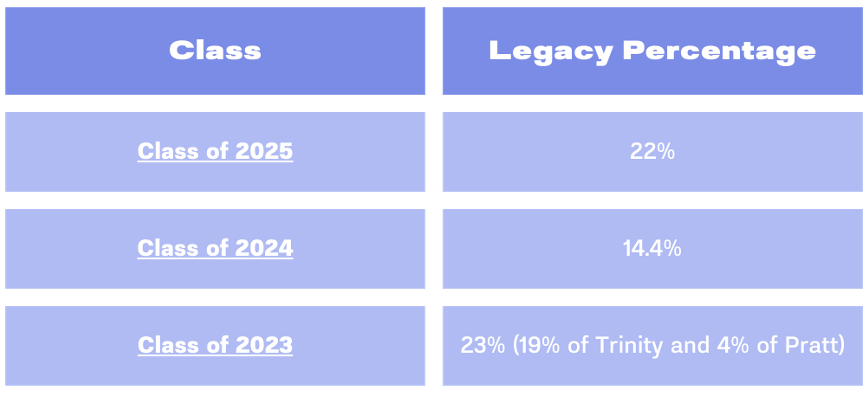We work with legacy students every year and parents always have questions about legacy admissions. It might seem simple, but at top schools like Duke, it can be more complicated than you think. We have been doing a series on legacy admission and wanted to break down legacy admissions at Duke and answer some of our most frequently asked questions.
Who is a Legacy at Duke?
Duke defines legacy as “children and grandchildren of alumni.” Many top colleges only consider children of alums and not grandchildren, so Duke is slightly unique for considering both. Notably, Duke rarely uses the term legacy. Instead, they say “children and grandchildren of alumni” on their materials.
Duke says on their alumni page, “while alumni affiliation by no means ensures acceptance to Duke, the university… does note alumni status when reviewing applications.” The alumni association also is proud to be “a supporting voice for all alumni children and grandchildren who apply for undergraduate admission.” It’s no secret that children and grandchildren of alumni are given special consideration in the admissions cycle, but what does that look like in practice?
How many legacies are on Duke’s campus?
Duke’s newspaper publishes a freshman survey yearly. This survey does ask about legacy status, however, it defines this differently than the admissions office. This survey tracks parents and siblings that have gone to Duke. While this isn’t a perfect metric, it gives us insight into how many students at Duke have some sort of legacy affiliation.
Pre the Class of 2023, the Duke survey did not ask about legacy status and Duke does not publish legacy numbers elsewhere. Meaning, it’s hard to establish a full trend on how many legacies they let in year to year. Many schools tend to be a little cloak and dagger when it comes to legacy admissions. We talk to admissions officers and insiders every admissions season and legacies are one of the topics that they hate going on record about. However, this can pose a problem for parents who need information. It’s stressful not knowing if your student will get in or not, but there are some tips for helping their odds.
How can I help my student get in?
Being a legacy will most likely help your student get into Duke. Even if that just means the admissions office takes more time reviewing their application. However, simply being a legacy isn’t enough to guarantee entry. Not every or maybe even most legacy candidates will get into Duke and that is just a function of how competitive Duke has gotten especially recently.
The regular decision acceptance rate has been hovering around 5% with a record low of 4.3% for the class of 2025 and most recently 4.6% for the Class of 2026. This is a very competitive rate. The first thing to consider is applying Early Decision. Duke’s ED acceptance rate was 21% for the Class of 2026. ED is especially good for legacy candidates. For the Class of 2025, “Legacy students were more likely to apply early decision than regular decision to Duke—81.7% versus 54.4%, respectively.”
Applying ED will help your student immensely, but it’s also important that whenever they apply, their application needs to stand out.
What makes a student stand out?
There are many ways for students to stand out. Being a legacy will help them stand out a little, but they need much more than that. You don’t need to be a basketball star or donate a small fortune to stand out (though those things never hurt), but you do need a killer application.
Whether your student is up against other legacies or in the general population, their application has to be good. Many very qualified students apply to Duke, so the first thing they need is good grades and test scores. On top of that, they need a ‘wow’ factor to stand out. This wow factor comes from amazing extracurriculars and great essays.
Creating great applications can be difficult and we advise working with a college counselor. We know this might sound self-serving, given that we are counselors, but working with a professional really does help. 22% of the Class of 2024 worked with a private counselor when applying to Duke and so did 21% of the Class of 2023. We’d be willing to venture a guess and say that most, if not all, of legacies who were accepted worked with a counselor. These are very significant numbers and there is a reason for that. Working with a professional ensures better applications and a higher chance of standing out to admissions counselors.
Getting into Duke isn’t guaranteed. Legacy or not. But there are a good amount of legacies on campus and an alumni association that pushes for children and grandchildren of alums. On top of that, there are ways to help ensure your student has the best chance of getting in imaginable. Having a strong application is a must if your student wants to follow in your footsteps at Duke.
Need help with applying to top schools? It’s what we do. Reach out here!
